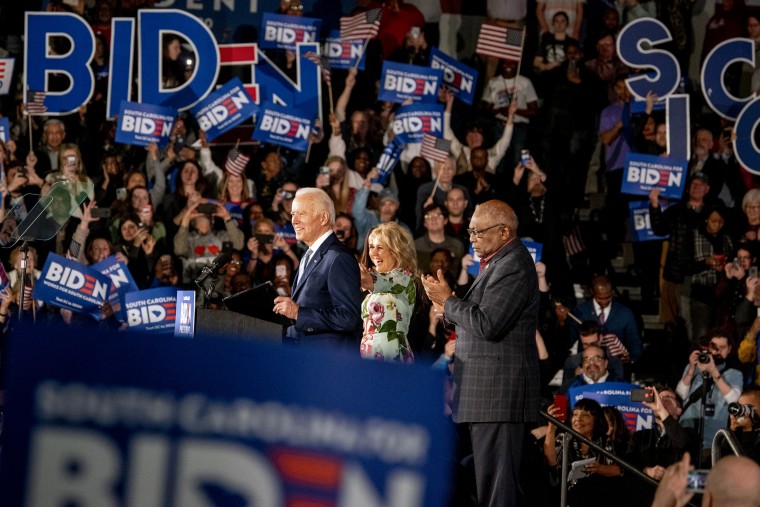Following a commanding win Saturday in South Carolina, former Vice President Joe Biden suggested Sunday that he's willing to battle through a contested convention should Sen. Bernie Sanders, I-Vt., enter the nominating event with a plurality but not the majority of delegates needed to seal the nomination.
The campaign of Sen. Elizabeth Warren of Massachusetts signaled Sunday that she, too, plans to fight for the nomination through the convention even if she does not come out of the primaries with the most delegates.
Those remarks came after Sanders said at a debate last month that whoever has the most delegates entering the convention, even if it is not a majority, should be the nominee. Rivals have called that a reversal of his position in 2016, when he ran against that year's eventual nominee, Hillary Clinton.
As it stands, Sanders leads Biden by just four delegates in the latest NBC News projection. Further back are Warren and former South Bend, Indiana, Mayor Pete Buttigieg and Sen. Amy Klobuchar, D-Minn. — who both dropped out of the race this week. There's also billionaire former New York Mayor Mike Bloomberg, who is appearing on the ballot for the first time in the Super Tuesday contests.
A total of 1,991 delegates are needed to clinch the nomination. Should that number not be met ahead of this summer's convention in Milwaukee, delegates could engage in multiple rounds of voting for a nominee — a process that could lead to a candidate with fewer delegates than the incoming leader becoming the nominee.
Speaking on CNN's "State of the Union," Biden said he would fight for the nomination even if he enters the convention in second place.
"Yes. I mean, look, the rules have been set. And I find a lot of folks in Bernie's operation are now saying that whoever goes in with the most delegates, even if they're not close or there's a distance from the 19-plus-hundred that we need, that that's — they should be declared the winner," Biden said. "I wonder where that view was when he was challenging Hillary after she went in with a commanding lead."
"Look, you don't change the rules in the middle of a game," he continued. "And I'm not at all certain that we're ... going to win with Bernie ahead. I hope that's not the case. I hope I'm ahead. But we will see. But I think you play by the rules."
Speaking on ABC's "This Week," Biden said "some of these campaigns" were not being consistent in their convention stances, saying Sanders has had an "epiphany" since 2016.
Sanders pushed back on the idea that he's changed his position, saying comments that were highlighted came before California, the state with the most delegates, had voted.
"And what I said is, at that point, if I can create momentum and if we win the California primary, then I think superdelegates might want to rethink where we're at," he said on "This Week." "That was before the end of the process."
"What you're asking me now is if, at the end the entire Democratic process, a candidate, maybe Bernie Sanders, ends up with more votes than anybody else, and we go into the convention, and the Democratic establishment and the superdelegates say, hey, yes, Bernie won more votes than anybody else, he won state after state after state, but we don't want him, you know what that will do to the Democratic base in this country?" he continued. "People will say, why — you are rejecting the candidate."
Sanders said that after California "it was over" and "we conceded the election and that — we supported Hillary Clinton." In 2016, California voters didn't cast ballots until June, far later than this cycle, when they'll vote on Super Tuesday.
Of Biden, Sanders said he has "no doubt that if I win, Joe will be there."
"If Joe ends up winning, I will be there," he added.
Meanwhile, Warren campaign manager Roger Lau wrote in a memo that after Super Tuesday, her campaign believes "no candidate will likely have a path to the majority of delegates needed to win an outright claim to the Democratic nomination."
"In the road to the nomination, the Wisconsin primary is halftime, and the convention in Milwaukee is the final play," he said. "Our grassroots campaign is built to compete in every state and territory and ultimately prevail at the national convention in Milwaukee."
Late last week, Bloomberg told NBC News' Kasie Hunt that he will stay in the race "right to the bitter end" as long as he's got a chance at winning the nomination. Bloomberg said that if Sanders hits the delegate threshold to secure a majority ahead of the convention, he would not continue his presidential bid. If Sanders amasses only a plurality, however, he will keep pressing forward, Bloomberg said.

